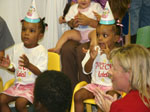No ‘terrible twos’ for children’s
program
by Megan FinkPublic Relations
The second anniversary of the MUSC Children’s Hospital Medically Fragile Children’s Program (MFCP) reflects more than just another year of operations; it symbolizes a second chance at life for children with chronic illnesses and disabilities.
 Amy and Ebony
Gordon help celebrate the MUSC Children’s Hospital Medically Fragile
Children’s Program’s second birthday Aug. 15. The Gordon twins were
part of the ‘MFCP Idols’ group that performed songs and instrumentals
for party guests.
Amy and Ebony
Gordon help celebrate the MUSC Children’s Hospital Medically Fragile
Children’s Program’s second birthday Aug. 15. The Gordon twins were
part of the ‘MFCP Idols’ group that performed songs and instrumentals
for party guests. Cake, ice cream and music from the young MFCP Idols added to the festive mood for the celebration among staff, families and children served by the center.
Pat Votava, MFCP manager, said she sees a miracle every day. “I know this might sound trite, but when you work with medically complicated children every day, everything you see is a celebration,” she said.
These select program participants face enormous challenges in life as medically complicated children and young adults involved in foster care placement in Charleston, Berkeley and Dorchester counties. Eventually more children will have access to the program when it is extended to all Medicaid-eligible children who meet enrollment conditions.
The comprehensive services are housed in one health resource center where participants have access to medical care 24 hours a day, every day of the year.
The pediatric-trained staff includes nurses, social workers, pharmacists, physical therapists, occupational therapists, a speech therapist, a dietitian, and pediatrician Kara Blevens, M.D. Blevens reports that these children have shown 100 percent improvement in health outcomes, with a high family satisfaction this past year. In addition, more than half of the foster children in MFCP have been adopted. “For me, working with children and families has been the most rewarding experience of my life,” said Blevens.
Though the MFCP has existed in other areas of the state, the MUSC Children’s Hospital program serves as a model for other children’s hospitals across the county. Blevens, Votava and Robin Smith, who is a parent involved in the program, even traveled to Seattle, Wash., to share their accomplishments and experiences at the International Conference on Family Centered Care.
Smith offered her personal reflection and spoke of her son, Sam, who now is able to eat without the assistance of a tube. “I’ve seen him do things in therapy that I never thought he’d be able to do. Sam has come so far,” she said. “I feel so blessed to be in a program that gives him the opportunity to literally be everything he can be. The MUSC Children’s Hospital Medically Fragile Children’s Program helps him get over daily hurtles.”
A partnership between the MUSC Children’s Hospital, the South Carolina Department of Health and Human Services (DHHS) and the South Carolina Department of Social Services (DSS) is the foundation of the MFCP. Staff is provided with the necessary tools for the treatment of its young patients, and caregivers learn skills tailored for their child and are given enough medicine and supplies to last a month. As a result, children are spending less time in the hospital, thereby saving the state money.
Steven Godbold, financial officer for the Children’s Hospital, said the program’s impressive outcomes “are a testament to the families and employees of the Medically Fragile Children’s Program. It is also indicative of the importance of the partnership between the MUSC Children’s Hospital, DHHS and DSS.”
Friday, Aug. 31, 2007
Catalyst Online is published weekly,
updated
as needed and improved from time to time by the MUSC Office of Public
Relations
for the faculty, employees and students of the Medical University of
South
Carolina. Catalyst Online editor, Kim Draughn, can be reached at
792-4107
or by email, catalyst@musc.edu. Editorial copy can be submitted to
Catalyst
Online and to The Catalyst in print by fax, 792-6723, or by email to
catalyst@musc.edu. To place an ad in The Catalyst hardcopy, call Island
Publications at 849-1778, ext. 201.